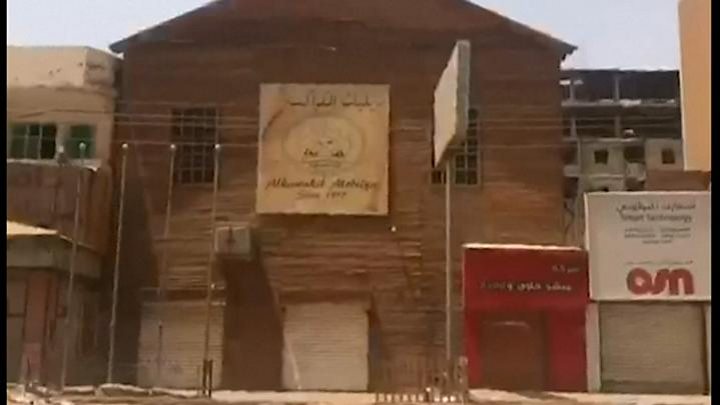Sudan talks ‘to resume soon’ as strikes halted
Protest and military leaders in Sudan have agreed to resume talks soon, an Ethiopian mediator says.
Separately, an opposition alliance agreed to suspend its campaign of civil disobedience and widespread strikes.
The army – which has been in control since long-time President Omar al-Bashir was ousted in April – has agreed to release political prisoners, special envoy Mahmoud Dirir told reporters.
Pro-democracy protesters are demanding a return to civilian government.
Talks broke down after dozens of protesters were killed in a crackdown on a sit-in on 3 June. Since then much of the country has been shut down after the opposition called for an open-ended strike.
Doctors say 118 people have died in the recent outbreak of violence, while officials say there were fewer fatalities – putting the number at 61.
Soldiers have patrolled the streets of Sudanese towns since then, while most businesses have remained closed.
What happens now?
On Tuesday, the Ethiopian mediator between the two sides said that talks on restoring a civilian administration would begin soon.
The army has agreed to release political prisoners as a confidence-building measure, Mahmoud Dirir said.
The opposition Alliance for Freedom and Change issued a statement urging people to return to work on Wednesday.
The Sudanese Professionals Association (SPA), which called the strikes in the first place, backed the temporary suspension and urged people to return to work for the time being.
Some shops and services had already started to re-open, mostly among small businesses and daily wage earners who could not afford to remain closed.
What kind of deal could be struck?
Military leaders have yet to formally confirm the return to talks.
But a member of the Transitional Military Council (TMC), Salah Abdelkhalek, told BBC Arabic that it might agree to “equal” power sharing with the opposition.
However, he said the TMC was adamant that the head of the new council should be from the military.
He also said that some military officers had been responsible for the 3 June crackdown, and said hundreds of soldiers, including officers, had been arrested – and endorsed the idea of an international inquiry into the violence.
But he added the TMC was willing to negotiate without preconditions.
Earlier on Tuesday, the top US diplomat for Africa announced a trip to Sudan to urge both sides to resume talks.
News of the return to talks followed the intervention of Ethiopia’s Prime Minister Abiy Ahmed, who met both sides to try and break the impasse.
There are some reports suggesting that Mr Abiy suggested a 15-member ruling council for the transitional period, made up eight civilians and seven military officials.
As ever in this story, scepticism is necessary. The Ethiopian assertion that talks will resume “soon” depends on what is meant by soon.
The opposition Forces for Freedom and Change insist they are not about to return to the negotiating table. For now, any contact between both sides will take place via international mediators.
It is negotiation of a sort – but the opposition insists that before face to face talks begin, six conditions need to be met:
So far they have only the promise of prisoner releases. But any negotiation – even if it happens soon – will circle back to the same issue: will the military cede power to a civilian government? Nothing about the generals’ actions has indicated that this is an imminent possibility.
The fear is that they will use any negotiations to try to divide the opposition while security pressure is maintained on the streets.
Source: Read Full Article




